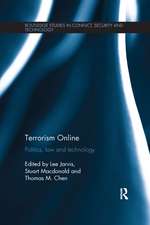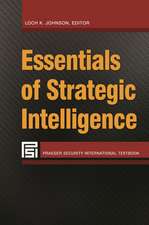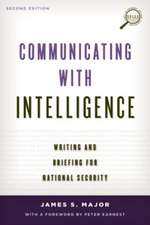The Future of Intelligence: Challenges in the 21st century: Studies in Intelligence
Autor Isabelle Duyvesteynen Limba Engleză Paperback – 23 iul 2015
This volume discusses the challenges the future holds for different aspects of the intelligence process and for organisations working in the field.
The main focus of Western intelligence services is no longer on the intentions and capabilities of the Soviet Union and its allies. Instead, at present, there is a plethora of threats and problems that deserve attention. Some of these problems are short-term and potentially acute, such as terrorism. Others, such as the exhaustion of natural resources, are longer-term and by nature often more difficult to foresee in their implications.
This book analyses the different activities that make up the intelligence process, or the intelligence cycle, with a focus on changes brought about by external developments in the international arena, such as technology and security threats. Drawing together a range of key thinkers in the field, "The Future of Intelligence" examines possible scenarios for future developments, including estimations about their plausibility, and the possible consequences for the functioning of intelligence and security services.
This book will be of much interest to students of intelligence studies, strategic studies, foreign policy, security studies and IR in general. "
Din seria Studies in Intelligence
-
 Preț: 425.86 lei
Preț: 425.86 lei -
 Preț: 326.99 lei
Preț: 326.99 lei - 9%
 Preț: 1107.26 lei
Preț: 1107.26 lei -
 Preț: 381.28 lei
Preț: 381.28 lei -
 Preț: 326.49 lei
Preț: 326.49 lei -
 Preț: 348.15 lei
Preț: 348.15 lei - 26%
 Preț: 821.46 lei
Preț: 821.46 lei - 18%
 Preț: 1111.72 lei
Preț: 1111.72 lei - 18%
 Preț: 1160.20 lei
Preț: 1160.20 lei - 18%
 Preț: 1111.27 lei
Preț: 1111.27 lei - 25%
 Preț: 354.07 lei
Preț: 354.07 lei - 26%
 Preț: 849.37 lei
Preț: 849.37 lei - 27%
 Preț: 247.87 lei
Preț: 247.87 lei -
 Preț: 442.71 lei
Preț: 442.71 lei - 18%
 Preț: 1279.51 lei
Preț: 1279.51 lei - 18%
 Preț: 1384.17 lei
Preț: 1384.17 lei -
 Preț: 501.87 lei
Preț: 501.87 lei - 25%
 Preț: 825.25 lei
Preț: 825.25 lei - 28%
 Preț: 820.80 lei
Preț: 820.80 lei - 32%
 Preț: 368.15 lei
Preț: 368.15 lei - 18%
 Preț: 1007.72 lei
Preț: 1007.72 lei -
 Preț: 417.59 lei
Preț: 417.59 lei - 18%
 Preț: 1060.25 lei
Preț: 1060.25 lei - 28%
 Preț: 821.13 lei
Preț: 821.13 lei -
 Preț: 496.35 lei
Preț: 496.35 lei - 28%
 Preț: 822.76 lei
Preț: 822.76 lei -
 Preț: 450.40 lei
Preț: 450.40 lei - 18%
 Preț: 1113.91 lei
Preț: 1113.91 lei -
 Preț: 444.23 lei
Preț: 444.23 lei - 18%
 Preț: 1224.24 lei
Preț: 1224.24 lei -
 Preț: 462.90 lei
Preț: 462.90 lei - 18%
 Preț: 1058.43 lei
Preț: 1058.43 lei - 18%
 Preț: 1391.72 lei
Preț: 1391.72 lei - 15%
 Preț: 455.66 lei
Preț: 455.66 lei - 28%
 Preț: 795.75 lei
Preț: 795.75 lei -
 Preț: 449.41 lei
Preț: 449.41 lei - 18%
 Preț: 1058.79 lei
Preț: 1058.79 lei - 18%
 Preț: 948.21 lei
Preț: 948.21 lei -
 Preț: 286.43 lei
Preț: 286.43 lei -
 Preț: 446.58 lei
Preț: 446.58 lei - 18%
 Preț: 1351.59 lei
Preț: 1351.59 lei
Preț: 441.74 lei
Nou
84.52€ • 88.25$ • 69.96£
Carte tipărită la comandă
Livrare economică 04-18 aprilie
Specificații
ISBN-10: 1138951951
Pagini: 182
Ilustrații: 5 black & white tables
Dimensiuni: 156 x 234 x 10 mm
Greutate: 0.27 kg
Ediția:1
Editura: Taylor & Francis
Colecția Routledge
Seria Studies in Intelligence
Locul publicării:Oxford, United Kingdom
Public țintă
Postgraduate, Professional, and UndergraduateCuprins
Notă biografică
Ben de Jong is retired lecturer in the Department of East European History at the University of Amsterdam, the Netherlands.
Joop van Reijn is former Chairman of the Netherlands Intelligence Studies Association (NISA), and a subject matter expert at The Hague Centre for Strategic Studies (HCSS) and a consultant for the Geneva Centre for Democratic Control of the Armed Forces.
Descriere
This volume discusses the challenges the future holds for different aspects of the intelligence process and for organisations working in the field.
The main focus of Western intelligence services is no longer on the intentions and capabilities of the Soviet Union and its allies. Instead, at present, there is a plethora of threats and problems that deserve attention. Some of these problems are short-term and potentially acute, such as terrorism. Others, such as the exhaustion of natural resources, are longer-term and by nature often more difficult to foresee in their implications.
This book analyses the different activities that make up the intelligence process, or the intelligence cycle, with a focus on changes brought about by external developments in the international arena, such as technology and security threats. Drawing together a range of key thinkers in the field, "The Future of Intelligence" examines possible scenarios for future developments, including estimations about their plausibility, and the possible consequences for the functioning of intelligence and security services.
This book will be of much interest to students of intelligence studies, strategic studies, foreign policy, security studies and IR in general. "






















